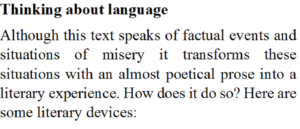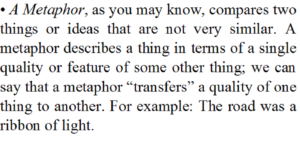English CBSE Class 12 NCERT Flamingo Chapter 2 Lost Spring Free Solution of Textbook Questions and Answers
LOST SPRING
(Text Book Questions)


Answer: Saheb is looking for gold in the garbage. He is looking for something of high value.
Saheb is working in the neighbourhood of writer. He has come to Delhi from Dhaka.


Answer: Children explain that it is a tradition to remain barefoot. But author thinks that they may not be wearing footwear because of their poverty. In order to hide the truth they talk of tradition.


Answer: Saheb is not happy working at the tea stall. He feels that he has lost his freedom. His face has lost the carefree look. The bag was his own. The canister belongs to somebody else.


Answer: City of Firozabad is famous for making of bangles. It is a big center for manufacturing of bangle. Bangles of all colours and quality are made here.


Answer: People have to work in very inhuman conditions. The light is very poor, circulation of air is also poor. The dust of glass tend to enter into eyes. These aspects put stress on eyes. Many become blind.
Temperature of furnace is very high. So it is not good for health.
Wages are very low. It is very difficult to make enough earning to take care of family.


Answer: The family wants to continue to work in bangle making industry. They are not able to think beyond this.
Mukesh is thinking differently. He has the courage to adopt a profession none in his family has followed. He wants to be a motor mechanic.
Attitude of family is traditional while that of Mukesh is courageous and adventurous.


Answer: Some of the reasons for migration of people from village to cities are as under –
- Not able to earn their living in village
- The natural calamity destroys their filed and house
- Lack of basic amenities in village
- Lack of opportunity in villages
- Lack of education in villages


Answer: I agree. Promises to poor children are made without seriousness. Often they are considered sub-human creatures. We would jokingly ask questions to check their emotions.
In the text, the author jokingly asks Saheb if she opens a school will he come to her school. After somedays Saheb asks if the writer had opened the school. The writer now realizes seriousness of Saheb while she was not at all serious. Writer appears to be checking determination of Saheb or playing with emotions of Saheb.


Answer: Money lenders, policemen, middlemen, bureaucrats and politicians support each other. The vicious circle formed by them ensures that workers remain poor.


Answer: Mukesh wants to become a motor mechanic. His thought of going to a local garage for learning is correct. Initially he would be treated as an apprentice. When he has understood good part of repairs, he will start earning. Soon he will be an independent person free from clutches of money lenders.
Now he would be ready to take next step. He should start saving a major part of his earnings. With his savings he should complete his education in ITI.
With formal education and practical training he will surely achieve his goal.


Answer: People have to work in very inhuman conditions. The light is very poor, circulation of air is also poor. The dust of glass tend to enter into eyes. These aspects put of stress on eyes. Many become blind.
Temperature of furnace is very high. So it is not good for health.
Wages are very low. It is very difficult to make enough earning to take care of family.
The nexus between moneylenders, policemen and middlemen ensure that families continue to remain in poverty. Any attempt to improve the life or living condition is not tolerated by these people.
So families, generation after generations, continue to live in poverty and inhuman conditions.


Answer: ‘Child Labour’ is work performed by a child that is likely to interfere with their right to education, or to be harmful to their physical, moral and social development or their health. A child employed at less than 18 yrs of age is regarded as a child labour.
Children are often forced to work in unhealthy and dangerous situation. At times it is as good as slavery.
During young age a child is entitled to education and play. If children are not put to school they will be mal-educated. Hence they will not be able to comprehend important aspects of life. When children do not get education, they are not able to take advantages of advancement in technology. Not only themselves but the next generation may remain at disadvantage.
Children have weaker bodies compared to adults. Their body cannot withstand the demand of hard labour. Deformities or permanent damage to their body may happen.
Mind of children is not fully developed. So ‘child labour’ may adversely affect their mental strength.
Children are the next generation to build nation. We would surely like to build a stronger nation.
Owing to above aspects, ‘child labour’ must be stopped.
In order to stop child labour, we should
- Provide free education to child upto 12th class
- Motivate the child to come to school through extra-curricular activities.
- Motivate the well-to-do people of society to fund education of child
- Implement laws to prevent child labour












Hyperbole


Methaphor


Metaphor


Metaphor


Simile


Metaphor


Metaphor


Metaphor


Metaphor


Hyperbole


Metaphor
****


0 Comments